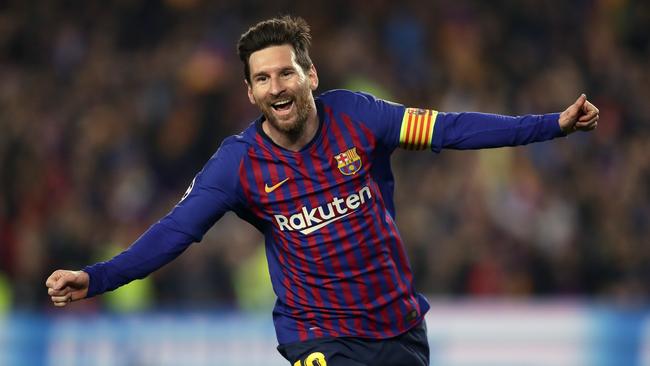Liverpool’s blueprint for stopping silent assassin Messi
What is it like playing against Barcelona maestro Lionel Messi? Liverpool are about to find out.

More than anything, it was the silence that struck Kelvin Wilson. Noise filtered down from those vertiginous stands at the Nou Camp, but on the pitch Lionel Messi and his teammates set about their business in total silence.
“They don’t really communicate,” the former Celtic defender says. “They don’t tell each other where and when they want the ball. They just know. And it sticks to their feet like glue.”
Wilson is recalling Celtic’s trip to Barcelona in the Champions League in October 2012. They had the audacity to take an early lead, and Wilson recalls that Messi “didn’t have his best game”, but these things are relative. The Barcelona forward still had eight shots and set up three chances before Celtic finally collapsed under a weight of possession and pressure in stoppage time.
“You can’t read which way he’s going to go,” Wilson says of Messi. “You hope he’s going to go one way rather than the other, but even if he does, he’s so hard to stop.”
Hard to stop, certainly, but not quite impossible. That is the consensus in advance of Liverpool’s Champions League semi-final, first leg away to Barcelona at 5am tomorrow (AEST), when they will try to succeed where Manchester United failed in the previous round, Tottenham failed in the group stage and so many others have failed in the past: by trying to contain the threat of the incomparable Messi — “the best player in the world,” as the Liverpool defender Virgil van Dijk said this week.
Bring it on? That is the phrase that Chris Smalling used before United faced Barcelona in the quarter-final. Messi was quiet in the first leg at Old Trafford, denied space by United’s 5-3-2 formation, but he still helped to set up the only goal of the game. In the second leg he scored twice and ran rings around Smalling, Phil Jones and Ashley Young. “He’s different class,” Ole Gunnar Solskjaer, the United manager, said after his team’s 3-0 defeat.
Messi’s performance against Tottenham at Wembley was even more beguiling; as well as scoring two goals, he hit the goal frame twice and played a stunning pass to Jordi Alba in the build-up to the opening goal. “Messi shows in every game why he is Messi,” Mauricio Pochettino, the Tottenham manager, said.
Not quite every game, though. At Celtic they fondly remember a famous 2-1 victory over Barcelona in November 2012. “It was one of those nights when everything clicked for us,” Wilson says. “Against them, you need a bit of luck and you need 11 players playing at the top of their game. That’s what we had.”
One of them was Adam Matthews, 20 at the time. “I was a bit nervous before the game, I’m not going to lie,” the defender, now at Sunderland, says, “but we didn’t talk about him (Messi) all that much. We didn’t do much preparation. If you build a player up too much beforehand, you might freeze with nerves.”
What is it like to play against Messi? “It was quite weird,” Matthews says. “He was on my side some of the time, but he just floated around, going where he wanted. If the ball was nowhere near, he would just be walking around. Then seconds later, you would turn around and ‘Where the hell has he gone?’
“You’ve got to stay very close to him, very tight, but not dive in. As a team, you’ve got to be ready to track the runners because he’s so good at finding them with a one-touch pass and those little one-twos. That’s the biggest thing, even more than his dribbling. He’s the best dribbler in the world and the best finisher in the world, but he’s also the best passer. It’s his brain. He knows what he’s going to do even before he gets the ball.”
Matthews, right-footed, was selected at left back that night. “I hadn’t played there too much before, and it can be difficult when you’ve got the ball, but you’re not going to get much possession against Barcelona anyway,” he says. “It’s probably easier for a right-footer to play at left back against Messi.”
That tactic had worked for Rafael Benitez’s Liverpool at the Nou Camp in 2007, when Alvaro Arbeloa, another right-footer at left back, performed superbly against Messi in a 2-1 victory. So too for Guus Hiddink’s Chelsea in 2009, when Jose Bosingwa did a similar job in a 0-0 draw in Barcelona.
In stark contrast to Matthews, Bosingwa remembers studying “hours and hours of videos” before looking to make his mark at the earliest opportunity.
“If I had let Messi have his way in the (opening) minutes, his confidence would have soared and mine would have been gone,” he said last year in an interview with Bleacher Report. “You give it everything in the beginning to establish the right relationship. Then it’s 90 minutes of psychological warfare.”
Somehow, though, it is hard to see Jurgen Klopp taking the same approach as Hiddink’s Chelsea, Benitez’s Liverpool or Lennon’s Celtic. He will not be shifting Andrew Robertson from left back to accommodate a right-footer. It is highly unlikely that he will switch from a flat back four to a back five. The main concession to Barcelona’s quality is likely to be the increased distance between Liverpool’s midfield and front three, but they will try to play to their own strengths.
“Liverpool have been defending and pressing brilliantly as a team,” Jose Enrique, their former left back, says. “You know you can’t leave yourself one v one against Messi, but you have to be prepared to play your own game too.”
THE TIMES


